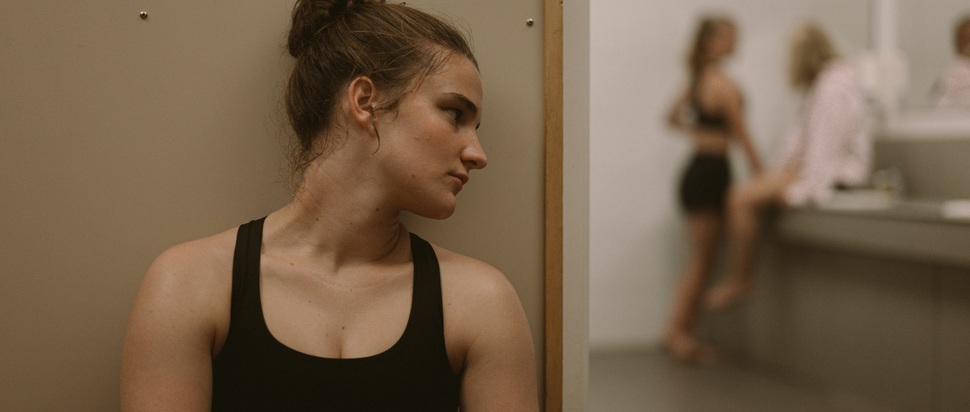Leonardo Van Dijl on Julie Keeps Quiet
Belgian drama Julie Keeps Quiet centres on a teen tennis prodigy who's trying to keep it together during an abuse scandal at her elite tennis academy. Director Leonardo Van Dijl explains his inspirations for the film and his hopes for its reception
A taut examination of power, abuse, repression, class dynamics and troubling things left unsaid, the debut feature of Belgian director Leonardo Van Dijl brings to mind a few veterans who made their name with realist filmmaking. “What can I say, I love the movies of Ken Loach and the Dardennes,” he tells me at the London Film Festival – the latter two, brothers Jean-Pierre and Luc, actually have co-producer credits on the film.
What makes Julie Keeps Quiet such a striking calling card is the restraint maintained throughout. Despite the anger and fear bubbling below the calm, collected exterior of his lead character, Van Dijl never shifts gears into loud outbursts or too convenient plot turns, something that's bothered dissenters of Loach's more recent work.
Played by acting newcomer and teen tennis player Tessa Van den Broeck, Julie lives and breathes her sport. A star pupil at a tennis academy, she’s set for a promising professional career. But when her coach is suspended after the suicide of a former prodigious student, suspicions of inappropriate conduct follow. Urged to speak up as an investigation is underway, Julie instead focuses on her game with a replacement coach. Her abstaining from commenting on anything, despite her close relationship with the accused, becomes more concerning the longer it goes on. It's evident to us, however, that Julie is contending with inner turmoil and trauma that she doesn't know how to articulate, rather than truths she is deliberately trying to conceal.
In contrast to his protagonist, Van Dijl welcomes opening up about the film's issues of abuse and repression, to some extent. “To talk about the movie is also a way to advocate for the values that I hope it presents,” he says. “I made this because I want to talk about how we, as a society, can create a safer world for Julie, and for all other children like her.”
The sincerity and intention behind the film helped attract the endorsement of Japanese tennis superstar Naomi Osaka, a prominent activist herself, who signed on as an executive producer just a few weeks before the film's Cannes premiere last May. Heading to the festival, Van Dijl was apparently fearful of a specific complaint that might arise in the reception.
“When you tell narratives about young promising women, they always get punished,” he tells me. “I often would say [Greek mythological heroine] Antigone was my inspiration for this, but she also gets punished. Look at Joan of Arc or The Red Shoes. That's [often] the narrative: these female characters who have a drive, ambition and who also have grit, and they get punished in one way or another. I was really keen that Julie wouldn't get punished for the choices she makes; that she holds agency to do that was very important. Going into Cannes, I was scared that the movie would get punished in reviews because I didn't punish Julie in the movie. That's why the support of Osaka was so welcoming because it was really like God, almost, saying, 'I'm with you on this one.'
“Luckily, we got good reviews,” he continues. “Of course you can see the movie and think it's bad. I can handle that, it's fine. But when people get personal in attacking Julie [the character], I feel a responsibility [to comment] because how you talk about this character is also how you talk about young boys and girls enduring the same as her, perhaps pushing them more into silence, when we want to offer new ways for them to, in a safe way, start whispering or speaking up.”
Understandably given the film's subject matter, Van Dijl takes many long pauses to properly express what he wants to convey. “In making this movie,” he says, “I started to understand that many more people than you'd think actually do want to talk, but they do it in a language that you sometimes can't always hear. I wanted to show that as with any form of injustice, Julie isn't the only victim. The whole society falls prey to the bad intentions of that coach. And it's hard for society to deal with that.
“This story is not only about the emancipation and liberation of this victim, but also about the work surrounding it; the people around her who also, little by little, learn how to deal with it in a better, more delicate way because we don't know [how]. If you don't have that language, how do you deal with it? Ultimately, the problem with abuse is that everybody, in a way, takes on the responsibility. And that idea of responsibility is also a reason for somebody to keep quiet – they'll be silent because they don't want to make other people feel guilty about what happened to them. We are, in that way, designing a system that encourages silence to keep on going, when, really, the only responsible [person] is the aggressor who makes the wrong [choice].”
Julie Keeps Quiet is released 25 Apr by Curzon
